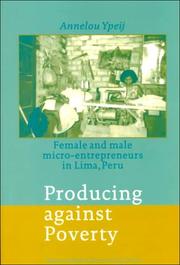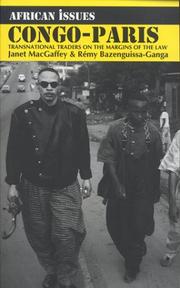| Listing 1 - 7 of 7 |
Sort by
|
Book
ISBN: 1462367577 1452769648 Year: 2000 Publisher: Washington, D.C. : International Monetary Fund,
Abstract | Keywords | Export | Availability | Bookmark
 Loading...
Loading...Choose an application
- Reference Manager
- EndNote
- RefWorks (Direct export to RefWorks)
During his tenure as Managing Director of the IMF, and in his interactions with civil society, Michel Camdessus was asked many questions related to the IMF's role in development. This pamphlet collects questions frequently asked by civil society around the world and the responses given by Mr. Camdessus that help to clarify the IMF position on human development.
Civics and Citizenship --- Civil service & public sector --- Civil society --- Economic sectors --- Education --- Education: General --- Formal and Informal Sectors --- Government Policy --- Institutional Arrangements --- International Economics --- Macroeconomics --- Poverty reduction and development --- Poverty reduction strategy --- Poverty reduction --- Poverty --- Provision and Effects of Welfare Program --- Public Finance --- Shadow Economy --- Social Services and Welfare --- Social welfare & social services --- Burkina Faso
Book
ISBN: 1462329802 145270788X 1281602116 1451895984 9786613782809 Year: 2000 Publisher: Washington, D.C. : International Monetary Fund,
Abstract | Keywords | Export | Availability | Bookmark
 Loading...
Loading...Choose an application
- Reference Manager
- EndNote
- RefWorks (Direct export to RefWorks)
Social capital is an instantiated informal norm that promotes cooperation between individuals. In the economic sphere it reduces transaction costs, and in the political sphere it promotes the kind of associational life that is necessary for the success of limited government and modern democracy. Although social capital often arises from iterated Prisoner’s Dilemma games, it also is a byproduct of religion, tradition, shared historical experience, and other types of cultural norms. Thus whereas awareness of social capital is often critical for understanding development, it is difficult to generate through public policy.
Investments: Stocks --- Labor --- Macroeconomics --- Civics and Citizenship --- Web: Social Media --- Economic Sociology --- Economic Anthropology --- Language --- Social and Economic Stratification --- Formal and Informal Sectors --- Shadow Economy --- Institutional Arrangements --- Human Capital --- Skills --- Occupational Choice --- Labor Productivity --- Labor Economics: General --- Pension Funds --- Non-bank Financial Institutions --- Financial Instruments --- Institutional Investors --- Education: General --- Civil service & public sector --- Labour --- income economics --- Investment & securities --- Education --- Social media --- social networking --- Civil society --- Human capital --- Stocks --- Economic sectors --- Financial institutions --- Social networks --- Technology --- Labor economics --- United States --- Income economics --- Social networking
Book
ISBN: 1462302785 1455254835 1451972113 Year: 2000 Publisher: Washington, D.C. : International Monetary Fund,
Abstract | Keywords | Export | Availability | Bookmark
 Loading...
Loading...Choose an application
- Reference Manager
- EndNote
- RefWorks (Direct export to RefWorks)
This paper documents the scale of capital flight from Russia, compares it with that observed in other countries, and reviews policy options. The evidence from other countries suggests that capital flight can be reversed once reforms take hold. The paper argues that capital flight from Russia can only be curbed through a medium-term reform strategy aimed at improving governance and macroeconomic performance, and strengthening the banking system. Capital controls result in costly distortions and should gradually be phased out as part of that medium-term strategy.
Banks and Banking --- Exports and Imports --- Criminology --- International Investment --- Long-term Capital Movements --- Formal and Informal Sectors --- Shadow Economy --- Institutional Arrangements --- Energy and the Macroeconomy --- Bureaucracy --- Administrative Processes in Public Organizations --- Corruption --- Banks --- Depository Institutions --- Micro Finance Institutions --- Mortgages --- Trade: General --- International economics --- Corporate crime --- white-collar crime --- Banking --- Capital outflows --- Capital controls --- Commercial banks --- Exports --- Balance of payments --- Crime --- Financial institutions --- International trade --- Capital movements --- Banks and banking --- Russian Federation --- White-collar crime
Book
ISBN: 9211614309 Year: 2000 Publisher: New York (N.Y.): United Nations
Abstract | Keywords | Export | Availability | Bookmark
 Loading...
Loading...Choose an application
- Reference Manager
- EndNote
- RefWorks (Direct export to RefWorks)
Home economics --- -Households --- Informal sector (Economics) --- -National income --- -AA / International- internationaal --- 339.0 --- 050 --- NBB multivolumes --- -339.32 --- Net national product --- Flow of funds --- Gross national product --- Income --- Hidden economy --- Parallel economy --- Second economy --- Shadow economy --- Subterranean economy --- Underground economy --- Artisans --- Economics --- Small business --- Domestic economy --- Domestic science --- Family and consumer sciences --- Household management --- Household science --- Family life education --- Home --- Consumer education --- Formulas, recipes, etc. --- Households --- Accounting --- Economic aspects. --- Algemeenheden. Nationale rekeningen. --- Officiële publicaties (per land). --- National income --- 339.32 --- AA / International- internationaal --- National accounting --- National income accounting --- Income accounting --- Social accounting --- Budgets, Family --- Budgets, Household --- Family budgets --- Household budgets --- Household expenses --- Economic aspects --- Officiële publicaties (per land) --- Algemeenheden. Nationale rekeningen

ISBN: 9053563776 Year: 2000 Publisher: Amsterdam Amsterdam university press
Abstract | Keywords | Export | Availability | Bookmark
 Loading...
Loading...Choose an application
- Reference Manager
- EndNote
- RefWorks (Direct export to RefWorks)
Informal sector (Economics) --- Small business --- Women-owned business enterprises --- Secteur informel (Economie politique) --- Petites et moyennes entreprises --- Entreprises appartenant à des femmes --- -Small business --- -#SBIB:327.4H61 --- #SBIB:328H32 --- Businesses, Small --- Medium-sized business --- Micro-businesses --- Microbusinesses --- Microenterprises --- Small and medium-sized business --- Small and medium-sized enterprises --- Small businesses --- SMEs (Small business) --- Business --- Business enterprises --- Industries --- Hidden economy --- Parallel economy --- Second economy --- Shadow economy --- Subterranean economy --- Underground economy --- Artisans --- Economics --- Derde wereld: economische ontwikkeling --- Instellingen en beleid: Midden en Latijns-Amerika --- Size --- Entreprises appartenant à des femmes --- #SBIB:327.4H61

ISBN: 0521790379 0521795427 0511720629 0511826060 Year: 2000 Publisher: Cambridge Cambridge University Press
Abstract | Keywords | Export | Availability | Bookmark
 Loading...
Loading...Choose an application
- Reference Manager
- EndNote
- RefWorks (Direct export to RefWorks)
One of the most remarkable aspects of the transition process in the former Soviet Union has been the extent to which the economy has effectively become demonetized in recent years. At the time of Russia's financial crisis of 1998 it was estimated that up to 70% of industrial output was being exchanged for barter. This book provides an accessible and authoritative analysis of barter in the former Soviet Union, addressing such questions as: • What has brought about this demonetization and why have we not seen the same phenomenon on a widespread scale in central and eastern Europe? • Does the nature of demonetization cast light on what underpins monetary transactions in industrial societies? • What are the consequences for output and growth? • Should the state intervene and how? • Does the network character of many non-monetary transactions have implications for the role and value of social networks in complex modern societies?
Barter --- Informal sector (Economics) --- 333.420.0 --- 336.208 --- 343.35 --- 382.54 --- RU / Russia - Rusland - Russie --- Hidden economy --- Parallel economy --- Second economy --- Shadow economy --- Subterranean economy --- Underground economy --- Artisans --- Economics --- Small business --- In-kind exchange --- Payment-in-kind --- Exchange --- Local exchange trading systems --- Theorieën in verband met de keuze van de geldstandaard. Currency substitution. Foreign currency deposits --- Grondslag, vereffening, inning en controle van de belastingen. Fiscale fraude. Zwartwerk. Parallelle economie --- Misdrijven tegen de openbare administratie, de belasting- en administratieve wetgeving --- Compensatiehandel. Ruilhandel. Countertrade --- Former Soviet republics --- CIS countries --- Commonwealth of Independent States countries --- Ex-Soviet republics --- Ex-Soviet states --- Former Soviet states --- New Independent States (Former Soviet republics) --- Newly Independent States (Former Soviet republics) --- NIS (Former Soviet republics) --- Commerce. --- Business, Economy and Management

ISBN: 0253337704 0253214025 0852552602 0852552610 Year: 2000 Publisher: Bloomington Indiana University Press
Abstract | Keywords | Export | Availability | Bookmark
 Loading...
Loading...Choose an application
- Reference Manager
- EndNote
- RefWorks (Direct export to RefWorks)
Foreign trade. International trade --- Congo-Brazzaville --- France --- Congo --- Business enterprises --- Merchants --- Informal sector (Economics) --- Entreprises --- Commerçants --- Secteur informel (Economie politique) --- Social aspects --- Aspect social --- Congo (Democratic Republic) --- Congo (Brazzaville) --- Congo (République démocratique) --- Commerce. --- Commerce --- #SBIB:39A4 --- #SBIB:39A73 --- Toegepaste antropologie --- Etnografie: Afrika --- Africans --- International trade. --- Commerçants --- Congo (République démocratique) --- International trade --- Hidden economy --- Parallel economy --- Second economy --- Shadow economy --- Subterranean economy --- Underground economy --- Artisans --- Economics --- Small business --- Business organizations --- Businesses --- Companies --- Enterprises --- Firms --- Organizations, Business --- Business --- Ethnology --- Businesspeople --- External trade --- Foreign commerce --- Foreign trade --- Global commerce --- Global trade --- Trade, International --- World trade --- International economic relations --- Non-traded goods --- Congo (Leopoldville) --- République du Congo (Leopoldville) --- Republic of the Congo (Leopoldville) --- Republic of Congo (Leopoldville) --- République démocratique du Congo --- Democratic Republic of the Congo --- Demokraticheskai︠a︡ Respublika Kongo --- Kongo --- Congo (Kinshasa) --- RDC (République démocratique du Congo) --- DRC (Democratic Republic of the Congo) --- DRK (Demokraticheskai︠a︡ Respublika Kongo) --- Democratic Republic of Congo --- DR Congo --- RD Congo --- Belgian Congo --- Zaire --- République populaire du Congo --- Kongo (Brazzaville) --- République du Congo (Brazzaville) --- Republic of the Congo (Brazzaville) --- Republic of Congo (Brazzaville) --- Congo (People's Republic) --- Ludowa Republika Konga --- Narodnai︠a︡ Respublika Kongo --- R.P.C. (République populaire du Congo) --- RPC --- People's Republic of the Congo --- Congo Republic (Brazzaville) --- Middle Congo --- Repubilika ya Kôngo --- Republíki ya Kongó --- West Congo --- ROC (Republic of Congo) --- Congo DR --- R.D. Congo --- Travail dissimulé --- Congolais (République) --- Concurrence déloyale --- Congo (République) --- Responsabilité sociale --- 1970-2000 --- Commerce extérieur
| Listing 1 - 7 of 7 |
Sort by
|

 Search
Search Feedback
Feedback About UniCat
About UniCat  Help
Help News
News